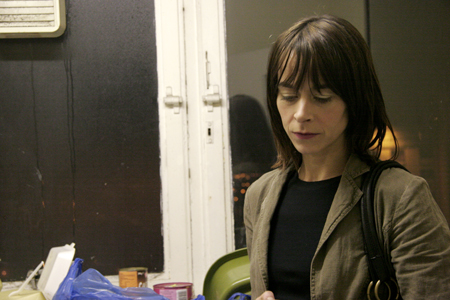|
Reviews of Recent Independent, Foreign, & Documentary Films in Theaters and DVD/Home Video
Written & Directed by: Andrea Arnold. Produced by: Carrie Comerford. Director of Photography: Robbie Ryan. Edited by: Nicolas Chauderge. Released by: Tartan Films. Language: English (with a strong Scottish brogue), thus the English subtitles. Country of Origin: UK. 113 min. Not Rated. With: Kate Dickie, Tony Curran, Martin Compston & Natalie Press. The tagline for the’90s surveillance thriller Sliver, “ You like to watch…don’t you,” could apply to the first half of Andrea Arnold’s audacious debut feature, as its working-class protagonist, Jackie (Kate Dickie), plays God, her eyes glued to over a dozen television monitors surveying the streets of Glasgow. As part of City Eye Control, she alerts the police at the sign of suspicious activity. Certain neighborhoods have their familiar set of characters for her: the man walking his aging and sickly English bulldog, or the nighttime office cleaner jamming to her headphones at work. Also under Jackie’s purview is the barren area around Red Road, home to a bleak concrete public housing project. During one desultory shift, she espies a blurry but familiar face. After her shift, she steals a number of surveillance tapes and views them at home, searching in slow-mo to catch a glimpse again of the disheveled, ginger-haired man. Her fears are confirmed; he’s Clyde Henderson (Tony Curran), recently released from prison for good behavior. A large part of Arnold’s hold on the audience is her enigmatic storytelling. With inferences instead of exposition, the audience learns, piece by piece, the unfolding circumstances, not unlike Jackie, who begins her own stakeout, following Clyde first via the city’s cameras and then on foot into a tea room. To reveal more would weaken the story-driven film. Despite the intense close-ups, Jackie’s motivations are impenetrable. Arnold vividly captures the ambience of the streets of Scotland’s largest city and the graffiti-strewn housing project; yet another reminder that nobody is better at telegraphing despair and poverty than the British. The well-received film won the Grand Jury Prize at last year’s Cannes Film Festival, but it may be more known for its pivotal sex scene, which arrives right before Jackie’s exploration becomes monotonous. Arnold’s more successful than Michael Winterbottom (9 Songs) or even John Cameron Mitchell (Shortbus) in unselfconsciously blending explicit sexuality within a narrative. (Sex is furthest from Jackie’s mind and the audience’s as well.) It’s the type of bedroom scene where the actors involved will mostly likely warn their parents to cover their eyes. Yet the seemingly realistic sex is one of the reasons the rest of the film is out of kilter. From this point onward, ambiguity gives way to pat resolutions, undermining the established sense of realism. After doling out clues here and there, the enigmatic film suddenly divulges everything, and the obvious modern-day parable overwhelms the subtle depiction of Jackie. The film could be a Sunday school lesson, except for the rough-and-tough language and the oral sex.
The characters and setting are based on the ideas of Danish filmmakers Lone Schering and Anders Thomas Jensen (cowriter of After the Wedding),
the first part of a proposed trilogy featuring the same set of characters and the same cast. Like Wedding,
there’s an uncomplicated moral message underneath the weight of its plot, also relying on coincidence. And despite Red Road’s step-by-step narrative, there’s a jarring plot hole (or two).
Kent Turner
|

